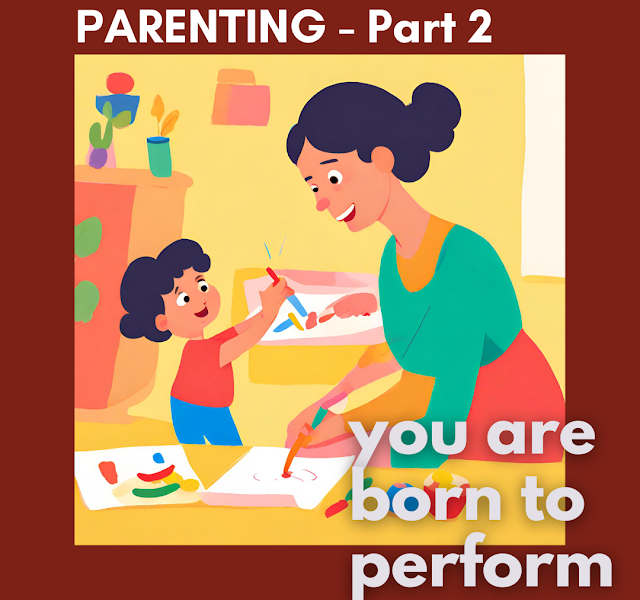In the diverse spectrum of parenting styles, the “Parent as a Performer” stands out as deeply invested in their child’s success. This category of parenting goes beyond participation and guidance; it embodies a fervent commitment to ensuring their child’s accomplishments in various aspects of life. In this blog, I will explain the defining characteristics, real-life examples, and potential impacts of the “Parent as a Performer” style on both parent and child.
The Role of the Parent as a Performer:
Parents adopting the “Performer” role are highly engaged in their child’s academic, extracurricular, and personal development. They are not only participating actively but also set high standards and dedicate extensive resources to ensure their child’s success. The essence of this parenting style lies in the belief that a parent’s involvement and meticulous guidance directly correlate with their child’s achievements.
Intense Engagement and High Expectations:
“Performers” exhibit an unparalleled level of involvement in their child’s pursuits. They meticulously monitor their progress, arrange additional support, such as tutoring or coaching, and strive to create an environment that optimizes success. This style is often characterized by high academic, athletic, or artistic expectations set by the parents.
Potential Impacts and Challenges:
While the “Performers” have a clear ambition to ensure their child’s excellence, this approach might inadvertently place immense pressure on the child. The pursuit of perfection can lead to stress, anxiety, and a fear of failure. Children might feel overwhelmed by the expectations set by their parents, impacting their mental well-being and overall development.
Statistical Insights:
Approximately 24% of parents exhibit the “performer” parenting style, according to data from the Child Mind Institute, USA. This style, while aimed at achieving remarkable results, also poses risks of burnout and emotional strain on children.
Finding a Balanced Approach:
As we explore the “Parent as a Performer,” it’s crucial to acknowledge the delicate balance between nurturing a child’s potential and ensuring their well-being. While parental involvement is essential, an excessive focus on success may overshadow a child’s autonomy and personal growth.
Parents as performers exemplify a fervent commitment to their children’s success. Although this approach aims to achieve outstanding results, it also raises concerns regarding the child’s emotional well-being and autonomy. In order to foster a balanced environment where children may thrive without feeling overwhelmed by high expectations, it is important to understand the impact of this parenting style.

The positive side of "The Parent as a Performer"
Parents who adopt this style are able to create an environment that encourages their children to take risks, think independently, and develop problem-solving skills. Additionally, this style can help to foster a sense of self-confidence in their child, as they know their parents will always be there to support them.
The environment provides many opportunities for a child’s development and success, despite its challenges:
- High Expectations for Achievement: Parents as performers set high standards for their children. This can motivate children to strive for excellence and develop a strong work ethic. When children are consistently challenged to meet higher expectations, they often rise to the occasion and achieve more than they thought possible.
- Structured Support: Performer parents often provide structured support systems for their children’s endeavors. This can include additional resources like tutoring, coaching, or access to specialized learning opportunities. Such support can enhance a child’s skills and knowledge in a particular area.
- Emphasis on Discipline and Responsibility: With a focus on achievement, parents as performers often instill discipline and a sense of responsibility in their children. These children may develop good time management skills, dedication to tasks, and a sense of accountability for their actions.
- Exposure to Diverse Opportunities: Performer parents often seek out various opportunities for their children to excel, exposing them to a wide range of experiences. This exposure can broaden a child’s horizons, allowing them to explore different interests and talents they might not have discovered otherwise.
- Celebration of Success: When children achieve success under the guidance of performer parents, it is often celebrated and acknowledged. This can boost a child’s confidence and self-esteem, fostering a positive attitude toward their abilities and accomplishments.
- Parental Involvement and Support: Performer parents are deeply involved in their children’s lives, showing immense dedication and support. While this involvement can be intense, it also reflects a strong commitment to their child’s growth and success.
While there are challenges associated with the performer style, such as pressure and potential burnout, these positive aspects can significantly contribute to a child’s development, helping them build a strong foundation for future endeavors. When balanced with emotional support and consideration for a child’s well-being, the positive elements of the performer style can empower children to reach their full potential.
The negative side of "The Parent as a Performer"
Parents may become overly competitive with their children, pressuring them to succeed. This can lead to the child feeling stressed and overwhelmed and can lead to them feeling like they are not living up to their parents’ expectations. Additionally, the focus on success can lead to the child feeling like they are not good enough if they don’t meet their parents’ goals.
In addition to promoting success and achievement, the “Parent as a Performer” style can also have a number of challenges and negative implications for both the child and the parent:
- Pressure and Stress: Children under the performer parenting style often experience immense pressure to meet high expectations set by their parents. This pressure can lead to stress, anxiety, and feelings of inadequacy, affecting their mental health and overall well-being.
- Fear of Failure: The emphasis on success may instil a fear of failure in children. They might avoid taking risks or trying new things due to the fear of not meeting their parents’ lofty standards, hindering their ability to explore and learn from setbacks.
- Lack of Autonomy: Children may feel that their choices and interests are overshadowed by their parents’ ambitions. This lack of autonomy can stifle their creativity, independence, and personal growth, leading to a sense of being controlled or micromanaged.
- Strained Relationships: The intense focus on achievement may strain the parent-child relationship. Children may feel disconnected or resentful towards their parents for placing excessive pressure on them, leading to communication barriers and strained interactions.
- Burnout and Exhaustion: Constantly striving for excellence in multiple areas can lead to burnout for children. Juggling academic pressure, extracurricular activities, and parental expectations without adequate breaks can exhaust them physically and mentally.
- Narrow Focus on Success: Children may prioritize achieving success at the expense of other essential life skills and experiences. They might lack opportunities to explore hobbies, socialize, or develop crucial emotional intelligence and interpersonal skills.
- Parental Stress and Anxiety: Performer parents often invest significant time, effort, and resources into their child’s success. This level of involvement and pressure to ensure their child’s achievements can lead to heightened stress and anxiety for the parents themselves.
- Unrealistic Expectations: Parents’ high expectations might not align with their child’s capabilities or interests. Expecting consistent high achievement without considering a child’s individuality and limitations can create an unrealistic and unattainable standard.
To balance the desire for success with a healthy and supportive environment for children, it is essential to understand these negative aspects. A child’s holistic development depends on finding a middle ground between encouraging achievement and fostering a well-rounded, emotionally balanced upbringing. Too much pressure can lead to burnout, anxiety, and feelings of inadequacy. On the other hand, if the environment is too lax, children may not develop a sense of ambition or a desire to strive for success. Striking the right balance is the key to helping children reach their full potential while still maintaining a healthy and supportive environment.
Parent as a performer: When it matters?
The role of the “Parent as a Performer” can be considered essential or beneficial in certain situations or contexts:
- When a Child Requires Additional Support: Some children may benefit from extra guidance and resources to excel in areas where they show exceptional talent or interest. The performer parent’s involvement in providing specialized support, such as tutoring or coaching, can nurture the child’s abilities.
- Pursuing Specific Goals or Competitions: In scenarios where a child is passionate about a particular competition, sport, or academic pursuit and aims for high-level achievement, the performer parent’s involvement might provide the necessary structure and support for success.
- Navigating Challenging Academic Circumstances: In highly competitive academic environments or when a child faces academic challenges, such as learning disabilities, the performer parent’s dedication to seeking additional assistance or tailored educational support can be crucial.
- Encouraging Excellence in a Safe Environment: When the performer parenting style is balanced with emotional support and a nurturing environment, it can create a space for a child to strive for excellence without feeling overwhelmed or excessively pressured.
- Preparing for Future Opportunities: In situations where specific skills or achievements are prerequisites for future opportunities, such as scholarships, prestigious programs, or career paths, the performer parent’s guidance and dedication might be instrumental.
- Cultivating a Strong Work Ethic: The performer parent’s emphasis on high standards and achievement can instil a strong work ethic in children, teaching them the value of dedication, persistence, and hard work.
It is important to keep in mind that the essentiality of the performer parenting style varies from child to child and situation to situation. Despite its ability to provide significant support and structure for children, a balanced approach that takes into account their well-being, interests, and autonomy is crucial for their overall development. An important consideration when adopting the role of performer is the context, the child’s temperament, and the parent’s ability to create a supportive environment.
– Makarand Bhatt
The writer of this blog is an experienced Global Career and education advisor, helping parents to plan and manage the global education of their children. You can share your feedback/reviews or connect with him at makarand.bhatt@yahoo.com or +91 99676 38666.












